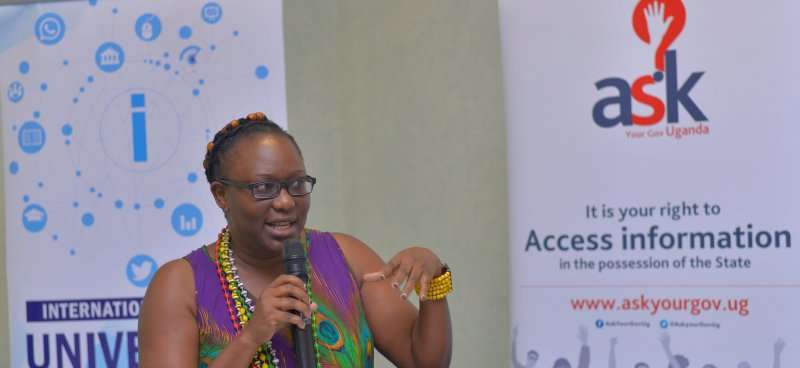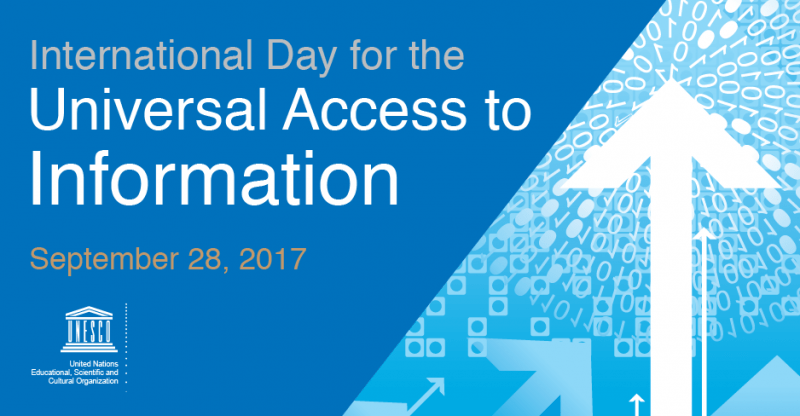By Loyce Kyogabirwe |
Despite the existence of legal and regulatory frameworks that promote the right to information, access to public information remains a big challenge in Uganda. The potential of ICT to promote citizens’ access to information is widely acknowledged and in 2014, the government and civil society partners launched the Ask Your Government (AYG) web platform that allows citizens to make online information requests to government Ministries, Departments and Agencies (MDAs).
However, four years on, it is evident that most citizens might not be aware of their right to information let alone the procedures for accessing information and data that is held by public bodies. Meanwhile, public officials continue to ignore citizens’ information requests despite efforts to equip both the duty bearers and rights holders, including information officers, journalists as well as women’s rights organisations, with knowledge and skills on rights and responsibilities.
User statistics from the AYG portal show an increase in the number of requests as well as number of public agencies registered on the portal. Between 2014 and 2016, only 243 requests were submitted to 76 agencies. But by June 2018, the number of information requests submitted had reached 2,450, to 106 MDAs (20 Ministries, 60 Departments and Agencies and 26 to Local Government Officials).

The highest number of information requests have been submitted to the Uganda Revenue Authority (URA) – 350 between June 2014 and June 2018, followed by the Ministry of Defence with 152.
However, the nature of requests lodged still indicates a misinterpretation of what falls under a public information request as most of the submissions are related to internships and Tax Identification Numbers (TIN). Perhaps this is an indication of the priority information needs of many of the portal’s users.
Also of concern is the low response rate to information requests. Of the 2,450 requests submitted between June 2014 and June 2018, only 121 have been indicated as successful and and 102 as partially successful, representing an average response rate of 9%. Less than 1% of requests (20) were rejected while those still awaiting responses are 2,074 or 85%. The 85% can be regarded as refusals under section 18 of the Access to Information Act (ATIA), 2005 which states: “an information officer fails to give the decision on a request for access to the person concerned within the period contemplated under section 16, the information officer is, for the purposes of this Act, regarded as having refused the request.” The response period is 21 days.
In some cases where public information was requested, users were advised to visit the respective MDAs in order to access such information. For example Davidson Ndyabahika, a journalist working with Uganda Radio Network, requested for statistics of enrolment and performance of both private and public primary and secondary schools in Ntungamo District from 2010 to 2016 from the Ministry of Education and Sports. He was advised to physically visit the Ministry offices where he would be cleared first before accessing such information. Such a response indicates challenges with digitised information storage and retrieval among public agencies although section 10 of the Act mandates information officers to ensure that records of a public body are accessible.
Equally, there are cases where limitations of the portal have emerged and information has been withheld because it can only be provided after payment of the statutory search fees. The ATIA specifies a non-refundable access fee of Uganda Shillings (UGX) 20,000 (USD 5) which remains a high cost for the majority of the population.
The limited levels of government responsiveness to information requests and uptake of AYG by both citizens and public officials impact upon initiatives working to promote access to public information for social accountability and civic engagement. This calls for more capacity enhancement, sensitisation and awareness raising among public officials of their duties and responsibilities as laid down in the Access to Information Act. Likewise, MDAs ought to utilise the different ICT platforms and tools to proactively release public information as prescribed in the Act and make efforts to ensure that citizens are aware of such information and where to find it.
Under Section 7 of the Act, public bodies are mandated to compile manuals containing descriptions, addresses, the nature of work, services and how to access information within six months after the commencement of the Act. However, 13 years since the law was passed, only the Ministry of Lands and Urban Development has adhered to this requirement. Indeed the ministry was in 2015 awarded the most responsive public entity as part of commemoration of International Day for Universal Access to Information (IDUAI).
Likewise, section 43 of the Act requires every minister to submit an annual report to Parliament on requests for records or access to information made to a public body under his or her ministry indicating acceptance or rejection, and reasons for rejection. However, there has never been any report from ministers since 2005 when the Law was passed, and Parliament has never demanded for such reports.
Meanwhile there should be efforts to continuously empower citizens to fully exercise their right of access to information as stated in Article 41 of the Constitution and Section 5 of the ATIA. Such efforts include capacity building of different demographic groups such as women, youth, persons with disabilities (PWDs), journalists, and teachers to demand for public information relating to service delivery and accountability while utilising different ICT platforms and tools including the AYG portal. Public officials should also be empowered to utilise these tools to proactively share public information with citizens.
The AYG is an initiative of the Ministry ICT and National Guidance in partnership with the Africa Freedom of Information Centre (AFIC) and the Collaboration on International ICT Policy for East and Southern Africa (CIPESA).
Study Reveals that a Culture of Secrecy Among Public Officials Hinders Media Work in Tanzania
By MISA Tanzania Correspondent |
A prevailing culture of secrecy among public officials in Tanzania at both central and local government levels is hindering the work of journalists, according to findings by a recent study. This is affecting access to information necessary for media reporting towards increased civic participation, transparency and accountability in governance.
The study which was conducted by the Media Institute of Southern Africa (MISA) Tanzania Chapter in partnership with the Collaboration on International ICT Policy for East and Southern Africa (CIPESA) assessed the responsiveness of local government authorities (LGAs) and central government offices in Tanzania to citizens’ information requests.
The study found widespread laxity among officials in processing information requests, with many claiming to have misplaced or lost filed requests. “If you received someone’s documents, why would you say you can’t see them just a week later?” wondered Haika Kimaro, a newspaper correspondent in Mtwara town in the south-east of Tanzania. In the port town of Kigoma, Rhoda Ezekiel, a correspondent with Uhuru Newspaper, recounted how the secretary of the Ujiji Municipal Council once claimed to have misplaced her information request when she followed up on a query she had submitted.
Radio journalist George Binagi shared a similar experience from the town of Mwanza: “I submitted my questions in writing to the Regional Commissioner’s Office. I went back 10 days later and did not get the answers. They looked for my letter and [claimed they] never saw it.”
But it is not only the media affected by limited access to public information. Researchers are affected too. During the study, Jacqueline Jones, a mass communication graduate and intern at MISA Tanzania, went to the Dar es Salaam Regional Commissioner’s office posing as a student researcher. She requested for information pertaining to the office’s functions, ongoing projects, income and expenditure. However, she was turned away for lack of an introduction letter from a university, with officials claiming that work procedures do not allow them to disclose information without such a letter.
“Their customer service is awful and the people at the registry department were quite harsh and rude. One of them actually shouted at me for insisting on getting my answers in a written form,” said Jones.
She submitted a similar request to the Dar es Salaam City Council, which, according to the city’s Information Officer needed approval by at least four different Heads of Sections. The Information Officer provided her with the requested information upon receipt of the approvals.
Alternative platforms for accessing information offered their own challenges. According to Zulfa Musa, a Mwananchi Newspaper correspondent in Arusha, administrative assistants manage the City Council offices’ telephone numbers and getting in touch with the Director or his Secretary to request for information required one to have these officials’ personal phone numbers. It was difficult to make information requests as the administrators were reluctant to provide the personal contact information of the Director or his secretary.
The frustrations faced by the journalists who took part in the study indicates that it is likely that citizens face similar or worse challenges.
It is widely recognised that access to quality and timely information for citizens is crucial in facilitating informed dialogue, monitoring and evaluation of development issues at the local level, thereby accountable governance and improved public services delivery.
Gasirigwa Sengiyumwa, the National Director for MISA Tanzania, stated that whereas an Access to Information Act was passed in 2016, “it appears that both public servants and the general public remain unaware of this Law.” He added: “There is a need for sensitisation about the law through training workshops for both parties [public officials and citizens] to ensure that the rights and responsibilities provided for under the law are realised.”
The study was conducted as part of the ICT4Democracy in East Africa initiative’s objective to document and publicise the utility and effectives of Information and Communication Technologies (ICT) for government-citizen interaction, proactive information disclosure, and responsiveness to information requests, for the realisation of the right of access to information.
Seven out of Tanzania’s 28 regions were covered in the study, with a total of 28 information requests filed to 14 institutions during March and April 2017. The written requests were emailed as well as hand-delivered to the institutions. Follow ups on approval or denial of requests was conducted through phone calls and physical visits.
Read the full study at here.
Access to Public Information in Uganda: Rhetoric or Reality?
By Loyce Kyogabirwe |
Norah Owaraga, a Ugandan researcher, recently narrated her experience on accessing government-held information in the country. She recounted a trip to Tororo district in eastern Uganda where she sought information on Tuberculosis prevalence in prisons. “I was told to go back to the prisons headquarters in Kampala (the capital) to get authorisation yet I had already received clearance from Uganda National Council for Science and Technology (UNCST) and the President’s Office to access government information. Why did I have to travel back to Kampala when I had all the clearance?” asked Owaraga.
Her question was directed at Frank Baine, the spokesperson of Uganda Prisons, during a dialogue held in Kampala to commemorate the International Day for Universal Access to Information, which falls on September 28.
In his response, Baine quoted section 4.8.1(i) of the Code of Conduct and Ethics for Uganda Public Service, 2006 and the Official Secrets Act 1964, stating that public officials are custodians of information that comes into their possession during the course of duty. “Without due permission from an authorising officer, such information cannot be communicated,” explained Baine. In Owaraga’s case, he said the authorising officer was not within the UNCST or the President’s office. Rather, it was the head of Uganda Prisons who had the mandate to authorise the release of the information.
Owaraga’s experience mirrors the challenges faced by Ugandan citizens in realising the right to access information. The right of access to information is enshrined in article 41 of the Constitution of the Republic of Uganda, 1995 which provides that, “Every citizen has a right of access to information in the possession of the state or any other organ of the state except where the release of the information is likely to interfere with the security of the state or the right to the privacy of any other person”. Uganda was among the first African countries to enact a right to information law, the Access to Information Act (ATIA), 2005 and later the Access to Information Regulations, 2011.
The ATIA is aimed at promoting transparency and accountability in all organs of the state by providing the public with timely, accessible and accurate information. Baine’s response instead highlights that a culture of secrecy still persists, with limited proactive release of information by public agencies and denial of citizens’ requests for information.
Other challenges that were raised during the dialogue include the high costs of accessing information, lack of knowledge of the provisions of ATIA among citizens and public officials, and the tedious procedures of requesting for information – all of which impact on the level of citizens’ information requests.
Despite the challenges, the government has taken some steps to promote access to public information. Speaking at the dialogue, Moses Watasa, Commissioner of Information Dissemination at the Ministry of ICT and National Guidance, explained that the Ministry is working to sensitise all government ministries, departments and agencies (MDAs) on ATIA as well as strengthening communication departments within MDAs and local governments with the aim of improving information gathering and dissemination.
Furthermore, the ministry has developed a centralised government information web portal (www.gov.go.ug), which functions as a gateway to all other government websites. The portal is reinforced by the ministry’s requirement for all MDAs to have a communications officer, functional website, a presence on social media and email addresses for officials to ensure public accessibility.
Watasa acknowledged that there has been a culture of secrecy among public officials further compounded by internal bureaucracies. He stated that the government was working to review archaic guidelines that restrict responsiveness or proactive disclosure by public officers.
Meanwhile, according to Watasa the government is also due to launch Open Government Sessions aimed at bridging the information gap between citizens and duty bearers. The sessions, which will be hosted monthly, will involve different MDAs interfacing with the public on functions, ongoing activities, budget allocations and expenditure and feedback. It is expected that the sessions will be broadcast live on TV and leverage social media platforms to allow remote participation.
However, it remains unclear when the archaic laws and guidelines will be reviewed and implemented to ease citizens’ access of public information. It is only through improved access to information that there can be increased social accountability and government transparency towards improved service delivery and greater citizen participation in governance and democratic processes.
The dialogue on access to information in Uganda was organised by the Collaboration on International ICT Policy for East and Southern Africa (CIPESA) in partnership with the Ministry of ICT and National Guidance in the context of the ICT4Democracy in East Africa initiative’s objective to engage stakeholders on supportive policies and practices for human rights and democratic governance in East Africa. It brought together 50 participants including public officials, policy makers, civil society, media, and scholars to reflect on the role of information in improving service delivery and accountability in Uganda.
Internet shutdowns take centre stage at #InternetFreedomAfrica forum
By Shitemi Khamadi |
When figures are put forth, bringing the arguments of something to the table, the conversation changes. One starts to look at the loss accrued from their actions or inactions and make an informed decision. In the same vein, when people come together to fight for a course, a just course, the likelihood of succeeding is higher.
This was the case at the Forum on Internet Freedom in Africa 2017 where the Collaboration on International ICT Policy for East and Southern Africa (CIPESA) launched a report affirming that over a period of 236 days, internet disruptions in 10 African countries led to loss of US$237 million. That is a colossal amount, equivalent to some budgets of key infrastructure projects on the continent.
Meanwhile, the 2017 State of the Internet Freedom in Africa Report themed; Intermediaries’ Role in Advancing Freedom: Challenges and Prospect also highlighted the critical role of telecommunications companies in government-initiated shutdowns and censorship.
 In a panel on privacy and freedom of expression, a representative from Zimbabwe’s Ministry of ICT, Postal and Courier Services asserted that the country will not shutdown the internet. Neither will they disrupt social media. The official stated that the negative effects of shutdowns initiated in other countries were clear and limiting access to the internet stifles expression, causes more harm than good. For an otherwise autocratic regime, this is telling of its appreciation of the impact technology has on the lives of citizens; social-economic and political.
In a panel on privacy and freedom of expression, a representative from Zimbabwe’s Ministry of ICT, Postal and Courier Services asserted that the country will not shutdown the internet. Neither will they disrupt social media. The official stated that the negative effects of shutdowns initiated in other countries were clear and limiting access to the internet stifles expression, causes more harm than good. For an otherwise autocratic regime, this is telling of its appreciation of the impact technology has on the lives of citizens; social-economic and political.
Equally important to the debate about quantifying the cost and impact of shutdowns was the session titled ‘Unmasking the real impact of internet shutdowns in Africa’. The panellists included Fiona Asonga from Tespok, a Kenyan organization that brings together telecom operators but also software & hardware developers & ICT hubs.
Asonga shared on policy advocacy efforts to push back against the Cameroonian government’s shut down of the internet in the English speaking regions for 93 days. She emphasised that continuous engagement was key to ensuring progressive actions from such governments.
The #KeepItOn session was great for advocacy enthusiasts. Here, coalition experiences of how to fight back against shutdowns were shared including joint condemnation letters to authorities and social media campaigns. Perhaps the most piercing is the collecting and dissemination of individual impact stories on the negative effects of shutdowns to lives. Such, go beyond abstract thoughts and conversations to real life scenarios.
Privacy was another recurring theme at the Forum with discussions highlighting the lack of data protection policies in many African countries, which had led to a growing trend of data breaches. For instance in Kenya where data protection is not well regulated, concerns arise as to whether intermediaries care an inch about the tons of private data they have on people. Kenyans receive unsolicited SMSs from politicians and businesses about their products. They can easily blame telcos for sharing their data but between the telco and themselves, lay tens of places like buildings and mobile money outlets where details are disclosed and any unscrupulous individual can mine for personal gain.
What was lacking from these conversations were insights on how African countries can fast track implementation of effective data protection laws. Going by the example of the Access to Information Act in Kenya that took the Private Members’ Bill approach after government stalled, could such an approach be explored towards citizens’ realisation of the right to privacy?
Overall, sessions at the Forums were quite timely, and so were the practical digital security clinics run by Access Now and DefendDefenders to ensure activists are equipped with the necessary skills and knowledge to work safely and securely.
Here is to a toss The Collaboration on International ICT Policy for East and Southern Africa (CIPESA) and the Association for Progressive Communications for a good job done.
The article was originally published on the iFreeKe website
Universal Access to Information in Africa: What Governments Need to Do
By Edrine Wanyama |
The annual celebration of the International Day for Universal Access to Information (IDUAI) on September 28 is aimed at highlighting the importance of access to Information (ATI) as a cornerstone of all other rights. This year’s IDUAI celebrations were held in Mauritius, organised by the United Nations Educational, Scientific and Cultural Organisation (UNESCO) as part of the E-learning Africa summit (E-Summit). The summit is a fora for deliberation on issues of access to learning and vocational training, access to information, equality and quality in education, literacy and governance with prioritisation of sustainable development solutions.
The Collaboration on International ICT Policy for East and Southern Africa (CIPESA) participated at the e-Summit, making contributions on open access to information and the prerequisites for ATI, including highlighting the need for a conducive policy, legislative and regulatory environment to ensure universal access to information in Africa. Among the measures proposed at the meeting were the full recognition of ATI by more African states supported by the implementation of ATI laws and regulations which effectively empower citizens to demand for information.
Discussions at the summit also entailed a call for governments to ease access to information across multiple platforms including online, in print and through traditional media, alongside clear procedures on how information can be accessed in instances when it is not publicly available. Further, there should be efforts to minimise the costs of accessing information as well as making clear provision for timely information request processing, response and complaints handling mechanisms. A key enabler of the realisation of ATI in many countries will be the repealing of draconian and conflicting legislation and putting in place robust personal data protection measures.
Meanwhile, at the Forum on Internet Freedom in Africa hosted by CIPESA in Johannesburg, South Africa, there was emphasis on the need for governments to limit exemptions to accessible information, improve on data storage mechanisms and systems, provide for mandatory disclosure of information and put in place strong and functional penal mechanisms against information officers who deny citizens information.
Access to information (ATI) is a fundamental human right recognised by international human rights instruments, including articles 19 in both the Universal Declaration of Human Right and the International Covenant on Civil and Political Rights. These articles provide for, among others, the right to freedom of opinion and expression including receiving and imparting information and ideas through media. ATI is also recognised in articles 13(1) and 17 of the Declaration on the Rights of the Child; article 15 of the United Nations Declaration on the Rights of Indigenous People; and the United Nations General Assembly Resolution 59 (1).
The summit brought together participants from all the 54 African countries. However, African countries continue to grapple with enacting ATI laws. Out of 54 countries, only 22 have enacted ATI laws. Additionally, these existing laws have been criticised for failing to meet international minimum standards, with limitation to access outweighing access rights.
Despite the overwhelming participation of African countries, the dilemma remains in the low response to ATI legislation. It should be noted that the lack of ATI legislation negatively impacts accountability and transparency by the state, which are tenets grounded on access to information.





